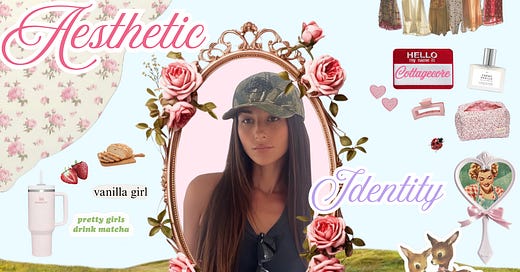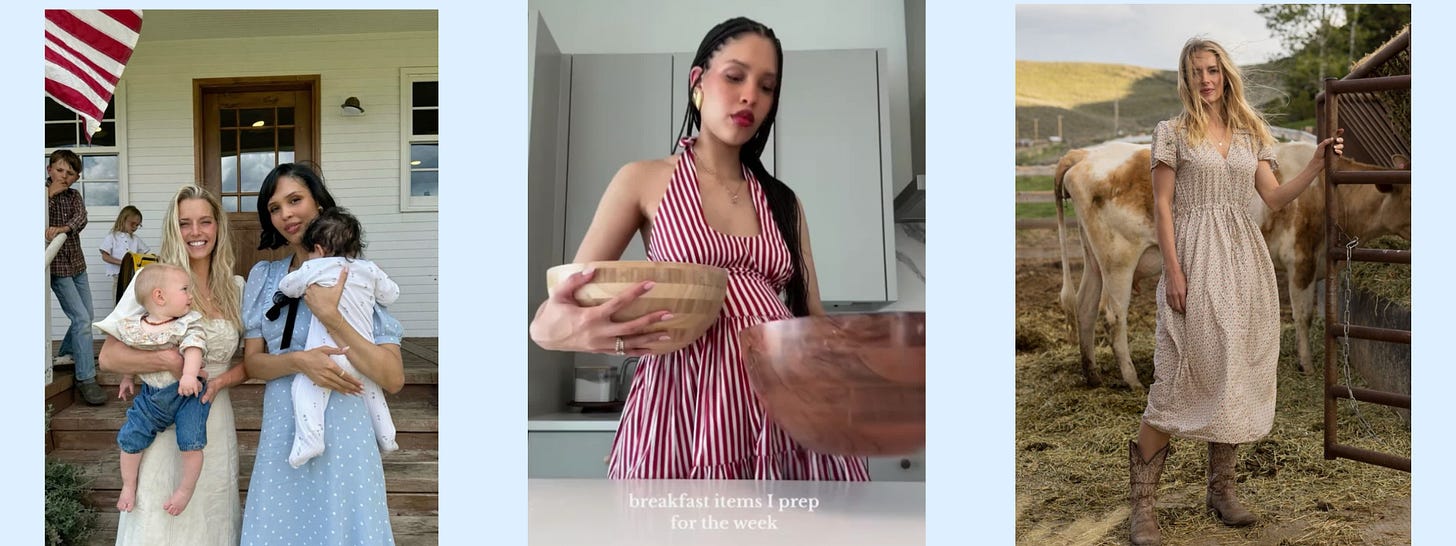Aesthetics vs Identity
How our instinct for community has been warped by niche marketing tactics (and social media)
Over the past few years of traveling full-time and living away from anything resembling familiarity, one thing has become glaringly clear: community is instinctual for a reason.
As humans, we are constantly stratified and stratifying ourselves based on how we are perceived—our interests, what we look like, and our differences.
This is not a new phenomenon; tribalism has (arguably) existed for as long as humanity, when early human societies were organized into small, close-knit groups. While there is nothing wrong with building a community based on similar interests and values, issues can arise when we attempt to build a community based on how we are perceived—it’s inherently self-conscious. I’m not saying I’m any better; I struggle daily with perception, and sometimes I feel like I’m watching myself live my life from the third person.
For example, instead of enjoying making pasta from scratch because I enjoy eating pasta made from scratch, I find value in being the type of person who makes pasta from scratch.
If you break this down—which I actively try to do—it means my motivation for making homemade pasta has everything to do with the perceived value of homemaking and from-scratch cooking. It means I like that other people view me as someone who is genuinely conscious of what I cook for myself and my family, and that I exude an aura of traditional femininity.
The hypocrisy is not lost on me. It’s not traditional or the least bit genuine to prop up my phone and record myself making pasta—because, in effect, I’m seeking the external validation that comes from being perceived as a homemaker and placing myself somewhere between the aesthetics of tradwife and cottagecore as a way to identify with something, anything. But it’s not real.
Even tradwives (Nara Smith, Ballerina Farm, etc.) aren’t real. While it may look like traditional family values and gender roles, in reality, they are extremely successful businesswomen and arguably the breadwinners of their households, who use aesthetics to their advantage—and it works. Because in reality, cottagecore looks like dirty overalls, long sweaty days planting seedlings under the hot sun, and making sourdough in the wee hours of the night because you just didn’t have time for it during the day (just ask Camilla).
While attempting to seek validation from my perceived value as it relates to niche marketing tactics, I came to the conclusion that what I am really seeking is a sense of community.
In a world where we used to find a sense of community in our institutions—religion, schools, families, etc.—it's clear that human beings require connection. We are political and social animals, and we can’t survive isolated; we need to connect with other human beings fundamentally. The breakdown of these institutions—families scattered across the globe in search of job opportunities, aging relatives placed in care homes rather than cared for at home, the rise of online classes, and the decline of religious participation—has left a noticeable impact.
Nowadays, it seems that everyone has niched themselves into an aesthetic: cottagecore, tradwife, dark academia, that girl—we’ve built our identities around how we are perceived. It really is like we’re living our lives in the third person. We’ve made life a stage and everything a performance, and it’s incredibly unsatisfying.
I don’t have an answer or an antidote for this, but it’s been on my mind a lot lately. I used to think it was because I moved abroad and lost the sense of familiarity and community associated with home, but I think moving away has just highlighted the fact that human beings have an intrinsic need to connect—fundamentally and without performance.
Sometimes, I feel like a zoo animal in an artificial habitat—I have instincts, but I can’t seem to find the path to connection. I want a sense of community, but I don’t want to be perceived in a real way, so I reject any efforts to try and build one. Instead, I assign myself an identity based on what I look like or my interests and build a shell around myself that protects me from any real connection—because it’s easier.
It’s worth mentioning that this phenomenon has a lot to do with marketing.
Brands piggyback on our intrinsic need for community in order to sell us puff-sleeved dresses that we associate with the cottagecore aesthetic. They utilize our base instincts for connection to the land and caring for our families, and warp it into carefully curated aesthetics for product placement purposes.
Buy this Christy Dawn dress, prop your phone up to film, and frolic in a field—it’s the same as working year-round on a garden, harvesting, and making a home-cooked meal for your friends and family. Except it’s not.
Maybe it's because many of us will never have the chance to own a house with a garden—but in theory, we can buy the dress and capture a small piece of that feeling. But as someone who has bought the dress, propped my phone up, and filmed myself frolicking through a field, it’s deeply unsatisfying—and it’s a waste of $300.
I’m currently attempting to detach my sense of self from the identities thrust upon us—and it takes real, ugly work and being honest with myself. While it’s not easy to build a community these days—especially when you’ve uprooted yourself and are living abroad—it feels like progress to be aware that the performance and aesthetics exhibited to the world are not the same as genuine human connection.
Hopefully, this means I’m on my way to cultivating a sense of community, instead of identifying with the next aesthetic trend and performing it for all the world to see.
More soon,
Kenza ✨








very true... aesthetics are often shallow, pale imitations of true personality and community. great to recognise this early and spend your energy on something real and lasting
"If I do what these influencers are doing/telling me to do, I belong", is a subconscious thought that is wayyyyy too pervasive in this day and age. We already belong. No need for labels or identity markers. Just by being here, we're valuable. But also we're utterly unimportant and our egos can take a break trying to convince us of it. We're nothing, and as a result, we can be everything. The relief that comes from not needing to be anything at all except a source of good whenever possible is mind blowing.